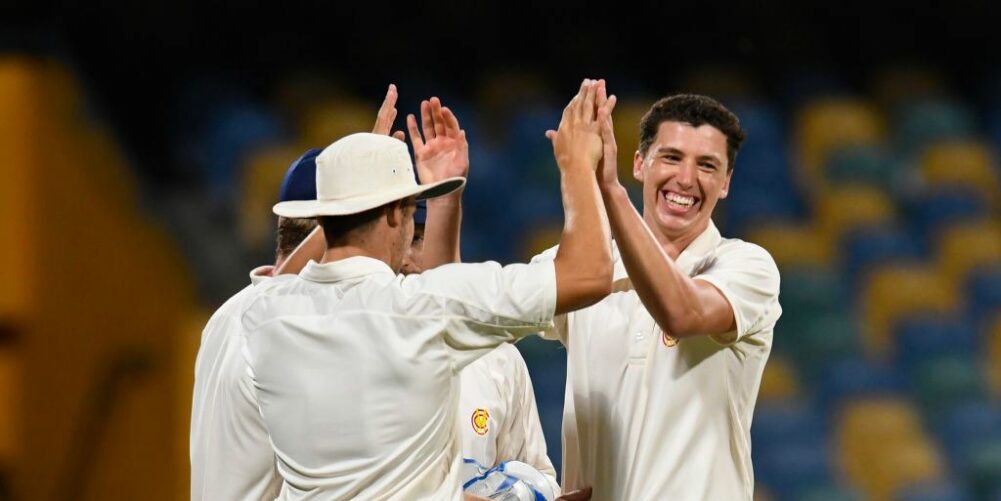The traditional season curtain-raiser between champion county and MCC begins in Dubai this Sunday, with players of both sides afforded the opportunity to impress England selectors desperately in search for some reliability in the Test team’s top-order.
With early season weather unpredictable, MCC, the match hosts, have held the fixture abroad – mostly in the United Arab Emirates – for the past nine years. Before that it was held at Lord’s where if it did move to a conclusion, rain, sleet or snow would still play their part.
Shifting the game to sunnier climes is not the only innovation MCC are credited with as the most famous members’ cricket club has gradually shed its crusty Edwardian image.
This game will use the new red Dukes balls which have tighter stitching of the seams to prevent them seaming around as much as last year’s batch. That means the match will be, rightfully, daylight hours only.
With a world Test Championship looming it makes sense for
the ball to be standardised. This, then, will be a good test of the
tweaked Dukes ball in conditions it wouldn’t be used in normally, the pitches
in the United Arab Emirates rarely as lavishly grassed as those in
England.
MCC are also keen to improve the speed of play which every year seems to slow to the point where another over is lost during the scheduled hours of play.
Fines for players or banning the captain haven’t worked and nor has overtime, so other solutions are being sought.
Although nobody has yet gone as far as to make it compulsory for bowlers to mark out their run-ups before play, most do so anyway, at both ends. But why stop there? Why not also have pre-marked lines on the crease for batsmen, showing leg, middle and off-stumps?
Those ideas have yet to be enforced but one thing that will
be tried out in Dubai is for umpires to put a countdown clock on the fielding
side. For the moment, the expectation is that the bowler must be ready to start
the next over within 45 seconds of the previous one ending.
Naturally, more time will be allowed for wickets (80 secs)
or other unforeseen events like injury. But the thought is that by chivvying
everyone along, including batsmen who like to fidget a lot at the crease or
obsessively scratch their guard – as Jonathan Trott used to do – the goal of 90 overs in six hours might not be pie in the
sky.
Drinks breaks, or at least the frequency of them, are also being looked at, though this may prove a difficult area for reform given the potency of scientific research around rehydration.
Mind you, as I will testify, I can count the number of drinks breaks I experienced at Essex and, for that case England in home Tests, on one hand. As one old teammate recently put it: “Our urine might have been brown by the end of play, but there were no fatalities.”

Other plans to speed up play revolve around banning huddles
on the field while also targeting the immediate aftermath of lunch and tea, two
periods where the fielding side is wont to meander more than they should. So
far, solutions to the latter point have not yet presented themselves though
perhaps a compulsory coffee might enliven those with post-prandial lassitude.
Another departure from convention MCC wanted to try in the
game was to allow a free-hit following a no-ball, something already done in
white-ball cricket. Incredibly, their intention has been blocked by the England
and Wales Cricket Board, once seen as progressive hipsters alongside their
be-striped and reactionary neighbours at Lord’s.
Apparently, the lack of electronic no-ball detection is the sticking point for ECB though that
seems unnecessarily nit-picking on their part. Umpires always used to be the judge of whether a ball was legal or not, so why not in this match?
John Stephenson, MCC’s assistant secretary (Cricket), and
the man behind their think-tank the World Cricket Committee, certainly feels
every effort should be made to enhance Test cricket’s appeal.
“The free-hit has been a point of great interest in white-ball cricket, so why not red?” he asked when I spoke to him. “Just imagine a batsman is given out lbw, which he reviews to find that the bowler has overstepped the front line. From being out one minute he now has a free-hit where the field cannot be changed. What drama. Test cricket needs little frissons of excitement like that.”
With several Surrey players away in the Indian Premier
League, the county will not be at full strength for the match. MCC, led by
Stuart Broad, will have an array of mostly young talent to represent them with
all eyes on the top five batsmen, an area of ongoing concern for England who have posted totals above 350 only five times
in their last 39 Test innings.
In that top-order are Dominic Sibley and Will Rhodes of
Warwickshire, Tom Westley and Dan Lawrence of Essex and Somerset’s Tom Abell. Of the five, Westley is the only
one to have played Test cricket, his brief foray ended when his weakness, of
playing across his front pad, was exposed. Even so, given the many chances
afforded Keaton Jennings, there are those who feel the selectors moved away
from Westley as England’s number three with indecent haste.This is where his
chance to show them they were wrong begins.
Abell, Somerset’s captain, is a methodical opening batsmen of the kind England’s Test team has been crying out for since the retirement of Alastair Cook at the end of last season.
His partner at the top of the order in Dubai is likely to be Sibley, a more forceful player but it could just as easily have been Rhodes, following the latter’s transformation from all-rounder at Yorkshire to left-handed opener alongside Sibley at Warwickshire.
The bowling attack, led by Broad and Essex’s Sam Cook, also contains the spinners Dominic
Bess and Stephen Parry, off-spinner and left-armer respectively and two players
at different ends of the age spectrum, Bess being 21, Parry 33. Beyond them they have the stalwart Peter Trego
and Rhodes to fill in with useful seamers.
In the nine years since MCC have taken the match abroad, the club has won four times and the Champion county five times. No draws is the key figure, but then that was the point of moving this fixture somewhere dry and sunny in the first place.
DEREK PRINGLE / Photo: Getty Images















